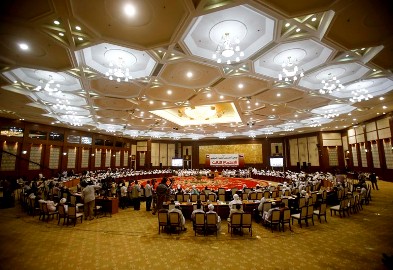U.S. calls to consider Sudan’s dialogue meeting as “first phase” to broader participation
October 8, 2016 (KHARTOUM) – United States has called on Sudanese government to consider the next-week national dialogue meeting as a first step for a broader process for peace and democratic reforms that will encompasses all the political and armed groups in the country.

Rebel groups and opposition parties refuse to join Khartoum process as they demand the government to end war and ensure freedoms in the country before. However, the U.S. backed talks brokered by the African Union are deadlocked, over the confidence building measures.
In a press statement issued on Saturday, U.S. Department of State Spokesperson John Kirby advised Khartoum’s government to wait before to conclude the process and to seek a wide-ranging dialogue that includes all the political and armed opposition groups for a viable settlement of Sudan’s internal crises.
“While we acknowledge that the conference will recognize the contributions of the different stakeholders to the National Dialogue, we believe it is equally important to strive for a representative and comprehensive national dialogue with participation from political and armed opposition, for a sustainable end to Sudan’s internal crises,” the statement read
“We urge the Government of Sudan to consider the current National Dialogue a first phase, and to engage with the opposition for its participation in an inclusive dialogue process, as prescribed in the Roadmap agreement negotiated by the African Union High Implementation Panel (AUHIP),” Kibry further said.
He warned that ending the dialogue at this stage could seriously impede the AUHIP-brokered negotiations for cessations of hostilities and humanitarian access agreements.
Recently, the alliance of armed and political groups, Sudan Call, blamed Khartoum for the failure to reach a humanitarian truce agreement. Also, they warned that they would hold their own dialogue process without the ruling party if the ongoing process wraps up its works without them.
Earlier, Sudanese President al-Bashir stressed that the end of the national dialogue on October 10, will close the door in front of any negotiations with the opposition. For his part, Presidential Assistant Ibrahim Mahmoud Hamid also accused the military and political opposition of lacking seriousness and stressed that the negotiations will end with the national dialogue conference in October.
Since last year, the American administration worked hard to bring the Sudanese parties to a comprehensive peace agreement ending war in the Two Areas and Darfur. Multiple sources said President Barak Obama initially wanted before to leave the White House next January to support regional efforts for peace and eventually lift sanctions on Sudan.
In January 2014, al-Bashir called on political parties and armed groups to engage in a national dialogue to discuss four issues, including ending the civil war, allowing political freedoms, fighting against poverty and revitalizing national identity.
Launched on 10 October 2015 for three months, the dialogue process was initially expected to wind up in January 2016 but it was delayed until October 10th.
(ST)
